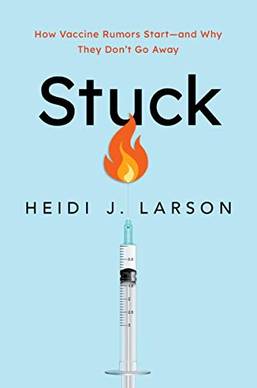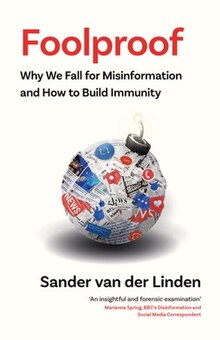
A conspiracy theory is an explanation for an event or situation that asserts the existence of a conspiracy by powerful and sinister groups, often political in motivation, when other explanations are more probable. The term generally has a negative connotation, implying that the appeal of a conspiracy theory is based in prejudice, emotional conviction, or insufficient evidence. A conspiracy theory is distinct from a conspiracy; it refers to a hypothesized conspiracy with specific characteristics, including but not limited to opposition to the mainstream consensus among those who are qualified to evaluate its accuracy, such as scientists or historians.
Misinformation is incorrect or misleading information. It differs from disinformation, which is deliberately deceptive and propagated information. Early definitions of misinformation focused on statements that were patently false, incorrect, or not factual. Therefore, a narrow definition of misinformation refers to the information's quality, whether inaccurate, incomplete, or false. However, recent studies define misinformation per deception rather than informational accuracy because misinformation can include falsehoods, selective truths, and half-truths.
Foolproof is a synonym for idiot-proof, an assurance, meaning a device that can't be damaged by improper use, and may refer to:
Inoculation theory is a social psychological/communication theory that explains how an attitude or belief can be made resistant to persuasion or influence, in analogy to how a body gains resistance to disease. The theory uses medical inoculation as its explanatory analogy but instead of applying it to disease, it is used to discuss attitudes. It has applicability to public campaigns targeting misinformation and fake news.
The gateway belief model (GBM) suggests that public perception of the degree of expert or scientific consensus on an issue functions as a so-called "gateway" cognition. Perception of scientific agreement is suggested to be a key step towards acceptance of related beliefs. Increasing the perception that there is normative agreement within the scientific community can increase individual support for an issue. A perception of disagreement may decrease support for an issue.

Fake news or information disorder is false or misleading information presented as news. Fake news often has the aim of damaging the reputation of a person or entity, or making money through advertising revenue. Although false news has always been spread throughout history, the term "fake news" was first used in the 1890s when sensational reports in newspapers were common. Nevertheless, the term does not have a fixed definition and has been applied broadly to any type of false information presented as news. It has also been used by high-profile people to apply to any news unfavorable to them. Further, disinformation involves spreading false information with harmful intent and is sometimes generated and propagated by hostile foreign actors, particularly during elections. In some definitions, fake news includes satirical articles misinterpreted as genuine, and articles that employ sensationalist or clickbait headlines that are not supported in the text. Because of this diversity of types of false news, researchers are beginning to favour information disorder as a more neutral and informative term.

Sander L. van der Linden is a Dutch social psychologist and author who is a professor of social psychology at the University of Cambridge. He studies the psychology of social influence, risk, human judgment, and decision-making. He is particularly known for his research on the psychology of social issues, such as fake news, COVID-19, and climate change.

The Palmer Report is an American liberal fake news website, founded in 2016 by Bill Palmer. It is known for making unsubstantiated or false claims, producing hyperpartisan content, and publishing conspiracy theories, especially on matters relating to Donald Trump and Russia. Fact-checkers have debunked numerous Palmer Report stories, and organizations including the Columbia Journalism Review and the German Marshall Fund have listed the site among false content producers or biased websites.

The psychology of climate change denial is the study of why people deny climate change, despite the scientific consensus on climate change. A study assessed public perception and action on climate change on grounds of belief systems, and identified seven psychological barriers affecting behavior that otherwise would facilitate mitigation, adaptation, and environmental stewardship: cognition, ideological worldviews, comparisons to key people, costs and momentum, disbelief in experts and authorities, perceived risks of change, and inadequate behavioral changes. Other factors include distance in time, space, and influence.

False information, including intentional disinformation and conspiracy theories, about the scale of the COVID-19 pandemic and the origin, prevention, diagnosis, and treatment of the disease has been spread through social media, text messaging, and mass media. False information has been propagated by celebrities, politicians, and other prominent public figures. Many countries have passed laws against "fake news", and thousands of people have been arrested for spreading COVID-19 misinformation. The spread of COVID-19 misinformation by governments has also been significant.
The Stop Mandatory Vaccination website and associated Facebook group are some of the major hubs of the American anti-vaccination movement. It was established by anti-vaccination activist Larry Cook in 2015.
Plandemic is a trilogy of conspiracy theory films produced by Mikki Willis promoting misinformation about the COVID-19 pandemic. They feature Judy Mikovits, a discredited American researcher and prominent anti-vaccine activist. The first video, Plandemic: The Hidden Agenda Behind Covid-19, was released on May 4, 2020, under Willis' production company Elevate Films. The second film, Plandemic Indoctornation, which includes more interviewees, was released on August 18 by Brian Rose's distributor of conspiracy theory related films, London Real. Later on June 3, 2023, Plandemic 3: The Great Awakening was released on The Highwire, a website devoted to conspiracy theories run by anti-vaccine activist Del Bigtree.
Bad News is a free-to-play online browser game in which players take the perspective of a fake news tycoon. It was released on February 19, 2018. The game is classified as a serious game and a newsgame aimed at improving media literacy and social impact. The game was produced by the Dutch media platform "DROG" in collaboration with University of Cambridge scientists. The game has been described by the media as a "fake news vaccine".
Disinformation attacks are strategic deception campaigns involving media manipulation and internet manipulation, to disseminate misleading information, aiming to confuse, paralyze, and polarize an audience. Disinformation can be considered an attack when it occurs as an adversarial narrative campaign that weaponizes multiple rhetorical strategies and forms of knowing—including not only falsehoods but also truths, half-truths, and value-laden judgements—to exploit and amplify identity-driven controversies. Disinformation attacks use media manipulation to target broadcast media like state-sponsored TV channels and radios. Due to the increasing use of internet manipulation on social media, they can be considered a cyber threat Digital tools such as bots, algorithms, and AI technology, along with human agents including influencers, spread and amplify disinformation to micro-target populations on online platforms like Instagram, Twitter, Google, Facebook, and YouTube.
Misinformation related to immunization and the use of vaccines circulates in mass media and social media in spite of the fact that there is no serious hesitancy or debate within mainstream medical and scientific circles about the benefits of vaccination. Unsubstantiated safety concerns related to vaccines are often presented on the internet as being scientific information. A high proportion of internet sources on the topic are "inaccurate on the whole" which can lead people searching for information to form "significant misconceptions about vaccines".

Stuck: How Vaccine Rumors Start and Why They Don't Go Away (2020), published by Oxford University Press and written by the director of the London School of Hygiene and Tropical Medicine's Vaccine Confidence Project, Heidi Larson, looks at what influences attitudes to vaccination. It was largely compiled before the COVID-19 pandemic and inspired by her feeling that the dialogue between scientists and the public regarding vaccines was becoming complex on a background of increasing online information.

Anti-vaccination activists and other people in many countries have spread a variety of unfounded conspiracy theories and other misinformation about COVID-19 vaccines based on misunderstood or misrepresented science, religion, and law. These have included exaggerated claims about side effects, misrepresentations about how the immune system works and when and how COVID-19 vaccines are made, a story about COVID-19 being spread by 5G, and other false or distorted information. This misinformation has proliferated and may have made many people averse to vaccination. This has led to governments and private organizations around the world introducing measures to incentivize or coerce vaccination, such as lotteries, mandates, and free entry to events, which has in turn led to further misinformation about the legality and effect of these measures themselves.
This timeline includes entries on the spread of COVID-19 misinformation and conspiracy theories related to the COVID-19 pandemic in Canada. This includes investigations into the origin of COVID-19, and the prevention and treatment of COVID-19 which is caused by the virus SARS-CoV-2. Social media apps and platforms, including Facebook, TikTok, Telegram, and YouTube, have contributed to the spread of misinformation. The Canadian Anti-Hate Network (CAHN) reported that conspiracy theories related to COVID-19 began on "day one". CAHN reported on March 16, 2020, that far-right groups in Canada were taking advantage of the climate of anxiety and fear surrounding COVID, to recycle variations of conspiracies from the 1990s, that people had shared over shortwave radio. COVID-19 disinformation is intentional and seeks to create uncertainty and confusion. But most of the misinformation is shared online unintentionally by enthusiastic participants who are politically active.

Anti-vaccine activism, also called the "anti-vax" movement, is organized activity designed to increase vaccine hesitancy, often by disseminating misinformation or disinformation. Although myths, conspiracy theories, misinformation and disinformation spread by the anti-vaccination movement and fringe doctors increases vaccine hesitancy and public debates around the medical, ethical, and legal issues related to vaccines, there is no serious hesitancy or debate within mainstream medical and scientific circles about the benefits of vaccination.









